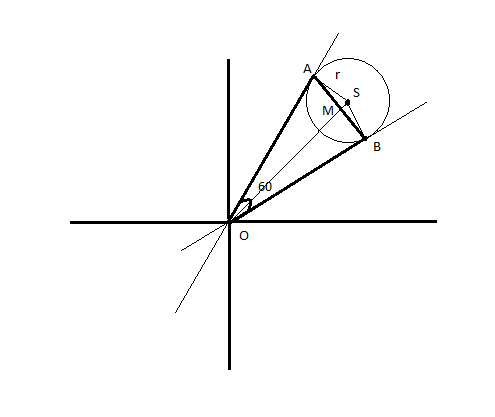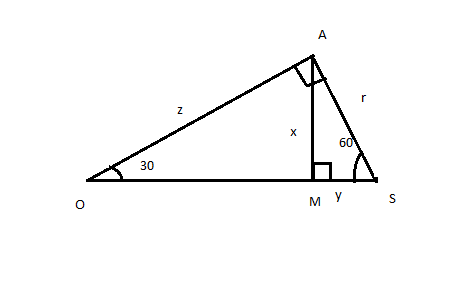Question
Question: If a circle of radius r is touching the lines \({x^2} - 4xy + {y^2} = 0\) in the first quadrant at p...
If a circle of radius r is touching the lines x2−4xy+y2=0 in the first quadrant at points A and B, then the area of triangle OAB (O being the origin) is:
(1)433r2 (2)43r2 (3)43r2 (4)r2
Solution
Hint: Find the individual lines from the combined equation of the pair of straight lines and then find the angle between the lines. Then draw a diagram to find angles and lengths to find the area.
Complete step-by-step answer:
To find the individual equations from x2−4xy+y2=0
Try to make square in one variable, by halving the coefficient of y and adding and subtracting the square of the halved term
y2−4xy+4x2−4x2+x2=0 (y−2x)2=3x2 y−2x=±3x
So the two lines are,
L1: y=(2+3)x and L2: y=(2−3)x
m1=2+3 and m2=2−3
Finding the angle between these lines using formula:
tanθ=1+m1m2∣m2−m1∣
After substituting, we get tanθ=3 so θ = 3π=60∘

OS is the angle bisector of the internal angle between the lines OA and OB and it meets the centre of the circle.
We know that AS will be perpendicular to OA by the property that radius is always perpendicular to the tangent and the lines OA and OB are the tangents.
To find the area of ΔOAB , let's find the area of ΔOAM which we can find by taking the difference in the areas of ΔOAS and ΔAMS .

Area of
ΔOAS=21×z×r ΔAMS=21×x×y
Now, From
ΔOAS z=rtan60∘ z=r3 ΔAMS x=rsin60∘ x=r23 y=rcos60∘ y=2r
Area of ΔOAB=2×(ΔOAS−ΔAMS)
On putting the values in
ΔOAS=21×z×r ΔAMS=21×x×y
We get
2[×(21×r×3r)−(21×21r×23r)] =433r2
Hence, option (1) is correct.
Note:
Deriving the individual equations from the combined equations should be known.
Properties of tangents are important in this case else the angles may go unnoticed and the question would become difficult to solve.
